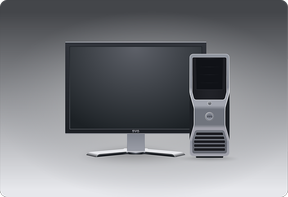Back in the days when I used to teach absolute beginners the basics of using a computer, surfing the internet and sending and receiving email, one of the questions that students often used to ask me was: I am considering buying a computer, should I buy a desktop or laptop?
Of course, there is no definitive answer to this question as it very much depends on how you plan to use your computer and what your lifestyle is. The only way to decide therefore is to do a direct desktop vs laptop comparison, carefully considering the relative advantages and disadvantages of each form of computer.


 Easier to fix and upgrade. Desktops are generally put together with the expectation that people will want to chop and change their components, either to fix parts that are broken, or to upgrade them. Many components just simply slot into the motherboard. Procedures such as installing a new disc or hard drive is actually relatively straightforward, even for an amateur, but it if you pay someone else to do it, it is still relatively inexpensive. Laptop repair can be very expensive, however.
Easier to fix and upgrade. Desktops are generally put together with the expectation that people will want to chop and change their components, either to fix parts that are broken, or to upgrade them. Many components just simply slot into the motherboard. Procedures such as installing a new disc or hard drive is actually relatively straightforward, even for an amateur, but it if you pay someone else to do it, it is still relatively inexpensive. Laptop repair can be very expensive, however. You don’t need your laptop to be permanently set up. For thosewho don’t use their computer regularly, or they only have a limited amount ofspace and they don’t wish to have a desktop set up all the time, a laptop can be great as you can stash it away when you are not using it.
You don’t need your laptop to be permanently set up. For thosewho don’t use their computer regularly, or they only have a limited amount ofspace and they don’t wish to have a desktop set up all the time, a laptop can be great as you can stash it away when you are not using it.

 Best Mechanics Tool Set 2015: Top 5on 04/20/2015
Best Mechanics Tool Set 2015: Top 5on 04/20/2015
 Top 4 Best Masticating Juicers 2014on 03/07/2013
Top 4 Best Masticating Juicers 2014on 03/07/2013
 What are Green Cards: US Lawful Permanent Residency Explainedon 02/18/2013
What are Green Cards: US Lawful Permanent Residency Explainedon 02/18/2013
 Islay single malt Scotch whisky: The basicson 02/17/2013
Islay single malt Scotch whisky: The basicson 02/17/2013


Comments
For me, between a desktop and laptop, laptops gain preference because they are portable. The ease of carrying them and the fact that they are light outweighs the drawbacks.